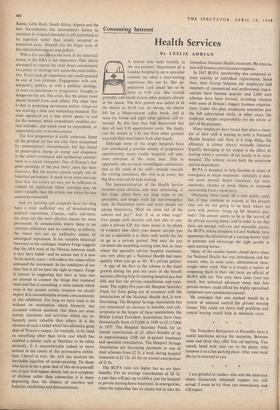Consuming Interest
Health Services
By LESLIE ADRIAN' Although some of the larger hospitals have now introduced a sensible scheme of progressive appointments, many smaller hospitals still sum- mon everyone at the same time. This is apparently not so much unintelligent administra- tion- as the result of the staff's attitude towards • the visiting consultant. His visit is- an event; the Big Man must not be kept waiting.
The bureaucratisation of the Health Service becomes most obvious, and most infuriating, at this stage, when there are long waits to see specialists; and longer waits for non-emergency beds. In frustration more and more people are asking themselves, 'Shall we come out of the scheme and pay?' And, if so, at what stage? Few people with families will feel able to con- sider a private GP, but there seems to be plenty of evidence that when your doctor advises you to see a specialist it is often well Worth the fee to go as a private patient. Not only do you cut down the unsettling waiting time, but, in cases where the specialist advises hospital treatment, you very often get a National Health bed more quickly when you go as Mr. X's private patient.
A sign of the flaw in the scheme is the rapid growth during the past ten years of the benefit societies offering help in meeting hospital pay-bed bills and fees for private consultation and treat- ment. The eighty-five-year-old Hospital Saturday Fund, far from going out of existence with the introduction of the National Health Act, is now flourishing. The Hospital Savings Association has just announced an increase in benefits, and sub- scriptions to the largest of these associations, the British United Provident Association, have risen dramatically from £133,000 in 1949 to £2,115,000 in 1957. The Hospital Saturday Fund, for an annual contribution of £3, offers benefits of up to approximately £100 for in-patient treatment and specialist consultation. The Hospital Savings Association are increasing payments in one of their schemes from £2 5s. a week during hospital treatment to £2 12s. 6d. for an annual contribution of £1 6s.
The BUPA rates are higher but so are their benefits. For an average contribution of £8 5s. a year they will pay up to £450 a year for hospital or private nursing home treatment. In emergencies, when the subscriber has no choice but to take the immediate National Health treatment, the associa- tion will finance convalescence expenses.
In 1947 BUPA membership was composed al- most entirely of individual registrations. Since then, their Group Schemes for employees and members of commercial and professional organ- isations have become popular and 2,600 such schemes have been formed, including schemes with some of Britain's biggest business organisa- tions. Under this plan, employees sometimes pay the full subscription while, in other cases, the employer accepts responsibility for the whole or part of the payment.
Many employers have found that when a mem- ber of their staff is waiting to enter a National Health hospital and there is a long delay, his efficiency is almost always seriously lowered. Equally damaging to his output is the effect of waiting when a member of his family is to enter hospital. The scheme covers both the employee and his dependants.
BUPA is designed to help families in times of emergency or major treatment : naturally, it does not cover normal dental treatment, eye tests, maternity, chronic or senile illness or expenses recoverable from a third party.
Obviously these funds fill a new public need, but, if they continue to expand at the present rate, are we not going to be back where we were with patients lining up for hospital pay- beds? The answer seems to be in the revival of the private nursing home; and in 'order to see that there are enough well-run and reputable places, the BUPA, whose president, is Lord Nuffield, have sponsored the formation of a nursing homes trust to promote and encourage the right people to open nursing homes.
Many of the smaller homes closed down when the National Health Act was introduced, and the nurses, who, in most cases, administered them, sought other work. Nor is it simply a matter of reopening them in their old form, an official of BUPA tells me. Not only have costs risen too much, but technical advances mean that few private owners could afford the highly specialised equipment now considered essential.
He considers that one method would be a system of national control for private nursing homes. This could cut down staff problems and central buying would help to minimise costs.
The Trocadero Restaurant in Piccadilly have a useful lunchtime service for motorists. Between noon and three they offer free car parking. You merely hand over your car to the porter who removes it to a free parking place. After your meal the car is returned to you.
I am grateful to readers who sent me addresses where Greenwich whitebait suppers are still served. I mean to try these out immediately and will report.




























 Previous page
Previous page